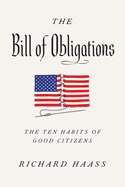
The Bill of Obligations: The Ten Habits of Good Citizens by Richard Haass presents a clear-eyed, nonpartisan solution to one of the greatest internal threats facing the fragile American democracy: the intractable political conflicts and lack of unity that are tearing apart the country. Haass contends that the very concept of citizenship needs to be revised if American political institutions are to endure. The Bill of Rights, enshrined in the U.S. Constitution, guarantees citizens civil liberties and privileges that, without a corresponding set of obligations, cannot sustain a successful democracy. Therefore, alongside a Bill of Rights, Haass proposes a "Bill of Obligations" that will require 10 civic-minded commitments of rights-holders.
Obligations to keep oneself informed, get involved and stay open to compromise are followed by the importance of maintaining civility and rejecting violence. Haass emphasizes that we must value norms, "the unwritten traditions, rules, customs, conventions, codes of conduct, and practices that reduce friction and brittleness in a society," and do our part to promote the common good. Respect for government service and support for the teaching of civics are followed by the profoundly character-building obligation to put country first.
Haass (The World: A Brief Introduction; A World in Disarray; Foreign Policy Begins at Home), a former diplomat, has served under Republican and Democratic administrations and is president of the Council on Foreign Relations. Written in concise, accessible language sure to appeal to readers across generational and political spectrums, The Bill of Obligations sets forth a compelling case for a revised concept of citizenship as the essential ingredient for a democracy that survives and flourishes. --Shahina Piyarali, reviewer

